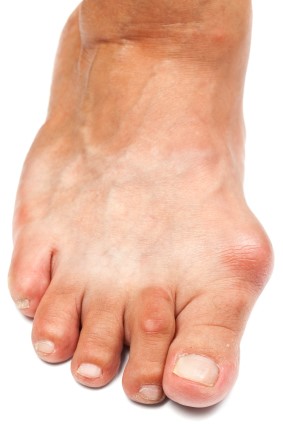 Bunions can be described as growths that form at the base of your big toe, usually caused by changes to our foot’s bone structure, such as ill-fitting shoes, flat feet, or genetics. Bunions are also known as hallux valgus, and are more common among women than in men. Properly-fitting shoes can help alleviate pain or irritation caused by bunions, and it is best to see your doctor to diagnose your condition and treat it. Other methods for treating bunions involve shoe inserts, supporting the feet through taping or splinting, and cortisone injections.
Bunions can be described as growths that form at the base of your big toe, usually caused by changes to our foot’s bone structure, such as ill-fitting shoes, flat feet, or genetics. Bunions are also known as hallux valgus, and are more common among women than in men. Properly-fitting shoes can help alleviate pain or irritation caused by bunions, and it is best to see your doctor to diagnose your condition and treat it. Other methods for treating bunions involve shoe inserts, supporting the feet through taping or splinting, and cortisone injections.
Bunion surgery usually occurs after non-surgical methods have proved to be ineffective. If you have any concerns,consult with Dr. Michael E. Newman of Pennsylvania. Our doctor will assist you with all of your foot and ankle needs.
What is a Bunion?
A bunion is formed of swollen tissue or an enlargement of boney growth, usually located at the base joint of the toe that connects to the foot. The swelling occurs by the bones in the big toe shifting inward, which impacts the other toes of the foot. This causes the area around the base of the big toe to become inflamed and painful.
Why do Bunions Form?
- Genetics – susceptibility to bunions are often hereditary
- Stress on the feet – poorly fitted and uncomfortable footwear that places stress on feet, such as heels, can cause bunions to form
How are Bunions Diagnosed?
Doctors often perform two tests – blood tests and x-rays – when trying to diagnose bunions, especially in the early stages of development. Blood tests help determine if the foot pain is being caused by something else, such as arthritis, while x-rays provide a clear picture of your bone structure to your doctor.
How are Bunions Treated?
- Refrain from wearing heels or similar shoes that cause discomfort
- Select wider shoes that can provide more comfort and reduce pain
- Anti-inflammatory and pain management drugs
- Orthotics or foot inserts
- Surgery
If you have any questions please feel free to contact our offices located in Plymouth Meeting and Ambler, PA. We offer the newest diagnostic tools and technology to treat your foot and ankle needs.
